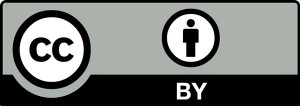Privacy Statement
The information provided on the Scientific Papers. Series B. Horticulture Journal’s website by the authors, such as names and email addresses will be used exclusively for the stated purposes of this journal and will not be made available for any other purpose or to any other party.
Copyright Notice
Al papers published in "Scientific Papers. Series B. Horticulture" are under the Open-Access Policy and are distributed under the terms and conditions of the Creative Commons Attribution License (https://creativecommons.org/licenses/by/4.0):

CC-BY Creative Commons Attribution Licence
This license lets others distribute, remix, tweak and build upon your work, even commercially, as long as they credit the publisher for the original creation. This is the most accommodating of licenses offered. Recommended for maximum dissemination and use of licensed materials.
Open access Policy and Fees
"Scientific Papers. Series B. Horticulture" is an open access journal that does not charge readers or their institutions for access. All research articles published in "Scientific Papers. Series B. Horticulture" in full text are immediately freely available to read, download, copy, distribute, print, search, link and share.
"Scientific Papers. Series B. Horticulture" currently does NOT receive any revenue from selling subscriptions for online view or print, defraying its editorial and production costs by funding article processing charges (APCs) from article publishing fees and from University of Agronomic Sciences and Veterinary Medicine of Bucharest’s own funds.
Currently, this journal charges the following author fees for publishing an article and participation to the Agriculture for Life and Life for Agriculture Annual Conference: 100 EUR.
Plagiarism Policy
Within the "Scientific Papers. Series B. Horticulture" there are analysed potential cases of plagiarism on their own merits. The Journal's Editorial Board uses an anti-plagiarism software system, to check the articles received for publishing, called Plagiarism Checker X.
If a plagiarism act is detected at any stage - before or after the acceptance, we will:
- if less than 25% of the original submission is plagiarized - inform the authors about the issue so in order to avoid the article's rejection, they can either rewrite the parts found as copied, either cite the original sources;
- if more than 25% of the original submission is plagiarized - reject the article and notify the author.
Additionally, as a CrossRef member, we are looking forward to implementing the CrossCheck system, that is well-suited to filtering academic content, being one of the best methods to detect the plagiarism in the online scientific community.
Digital preservation (archiving policy)
Our journal is committed to ensuring the long-term preservation and accessibility of its published content. To this end, we developed our own professional digital preservation service under the Journal Publisher's management. Currently, our journal is archived through the long-term preservation service provided by University of Agronomic Sciences and Veterinary Medicine of Bucharest, Romania. This service ensures the secure storage and perpetual accessibility of our journal’s content. It utilizes robust archiving methodologies to protect against data loss and degradation. By implementing this system, we ensure that our publications are preserved in compliance with recognized standards for digital preservation, including regular updates and checks to maintain data integrity.
The digital preservation service provided by University of Agronomic Sciences and Veterinary Medicine of Bucharest ensures a safeguard for the scholarly records, ensuring that our articles remain accessible to researchers and readers for future generations.
We continuously review our archiving strategies to align with best practices in digital preservation.
Repository policy
Our journal supports the open dissemination of research and allows authors to deposit versions of their work in our institutional repository. Below is our policy regarding the different versions of the papers that authors can deposit:
1. Submitted version (preprint): authors are allowed to deposit the submitted version of their manuscript (preprint) in our institutional repository at any time. There is no embargo period for this version. This needs to be accompanied by a statement that the manuscript is a preprint and has not yet undergone peer review.
2. Accepted version (author accepted manuscript): authors are permitted to deposit the accepted version (post-peer-review, but before final typesetting and formatting) of their manuscript in our institutional repository. This version can be deposited immediately upon acceptance, without any embargo.
3. Published version (version of record): the final, published version (version of record) can also be deposited in our institutional repository. Authors may share this version immediately upon publication, without any embargo. The published version should be cited appropriately with a DOI or a direct link to the journal's website.




